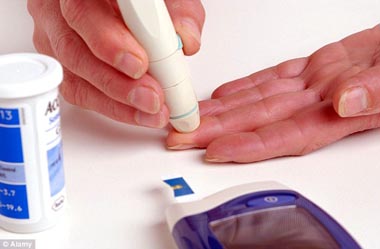 Diabetes mellitus is a common endocrine metabolic disease. It is characterized by abnormal increase of blood sugar concentration, glycosuria and decrease of glucose tolerance. Clinically, there is no symptom at the early stage, and polyphagia, polydipsia, polyuria, thirst, susceptibility to hunger, tiredness, and emaciation may appear later. Serious cases may have ketoacidosis and hyperosmotic nonketonic coma. There are also some common complications and concomitant diseases, such as acute infection, tuberculosis, atherosclerosis, renal and retinal angionosis, neuropathy, etc. The disease can be found at any age, but it is more common in the middleaged and old people. Continue to learn Chinese medicine Treatment for Diabetes.
Diabetes mellitus is a common endocrine metabolic disease. It is characterized by abnormal increase of blood sugar concentration, glycosuria and decrease of glucose tolerance. Clinically, there is no symptom at the early stage, and polyphagia, polydipsia, polyuria, thirst, susceptibility to hunger, tiredness, and emaciation may appear later. Serious cases may have ketoacidosis and hyperosmotic nonketonic coma. There are also some common complications and concomitant diseases, such as acute infection, tuberculosis, atherosclerosis, renal and retinal angionosis, neuropathy, etc. The disease can be found at any age, but it is more common in the middleaged and old people. Continue to learn Chinese medicine Treatment for Diabetes.
The morbidity increases with the age, with higher morbidity found in the people aged 45 and older and the highest in the people aged 60. The morbidity of diabetes in western countries is as high as 2 % to 5 %. In China it is 1.5 % to 2.3 % and the total number of patients suffering from diabetes is estimated to be about 20 million. Since it causes damages to many organs of the human body, bringing about higher mortality rate and disability rate, and seriously affecting the people's health and life quality, diabetes has been listed as the third serious disease following cardiovascular disease and rumor in many countries in the world.
The disease is closely related to the advance of age, obesity, reduction of physical labor and the habit of taking food of high caloric, high fat and high protein. Its basic physiopathologic changes are caused by the absolute or relative insufficiency of insulin secretion, leading to metabolic disturbance of carbohydrate, protein, fat, water and electrolyte, and even the acid-base imbalance in severe cases.
According to its clinical manifestations, diabetes is categorized in TCM as "xiao ke" or "xiao dan", both of which mean diabetes. It is attributed to yin-deficiency diathesis, improper diet, emotional disorders, overstrain and excessive sexual activities. The main pathogenesis lies in consumption of yin fluid leading to endogenous dryness-heat in the body, with yin deficiency as the principal aspect and dryness-heat as the secondary aspect, and often with the presence of blood stasis and phlegm retention. If prolonged yin deficiency impairs yang, this will result in deficiency of both yin and yang as well as deficiency of both qi and yin. Continue to learn TCM Treatment Evaluation for Diabetes.